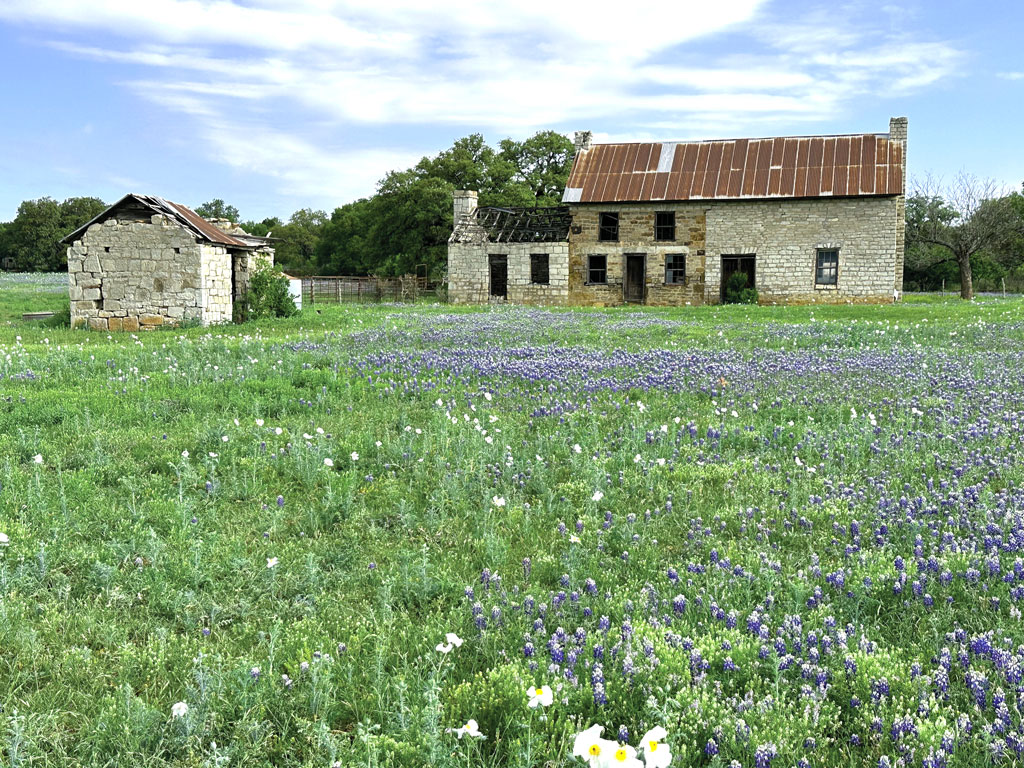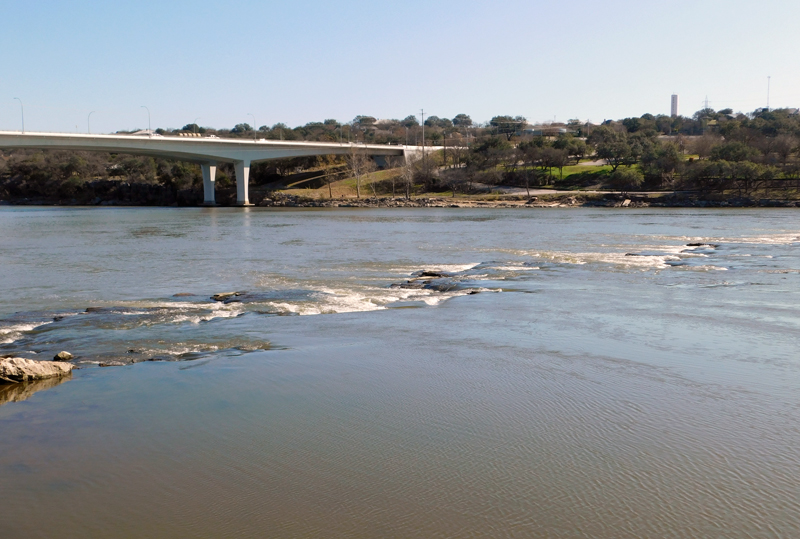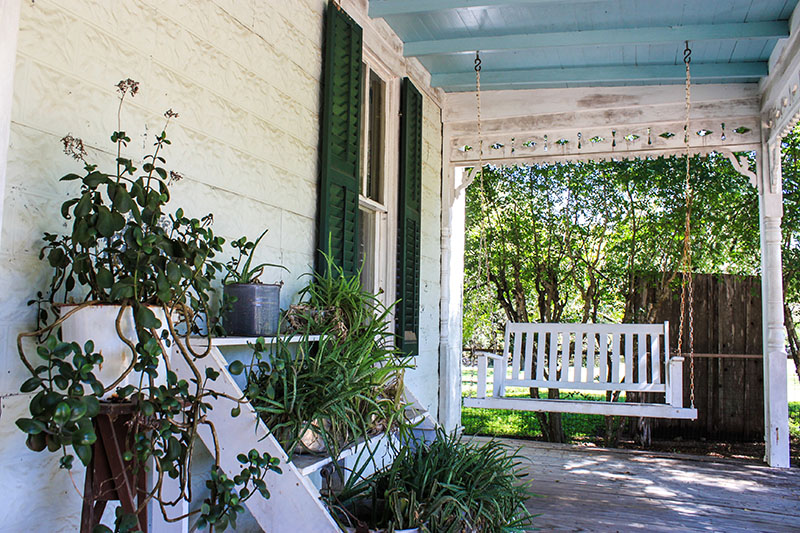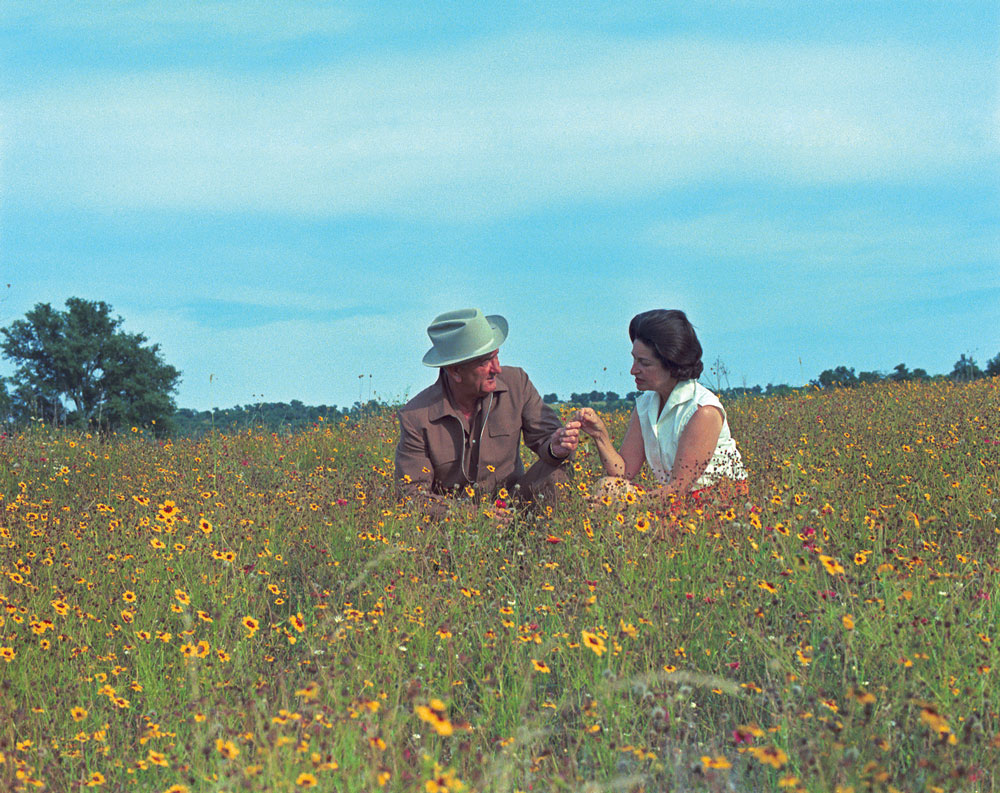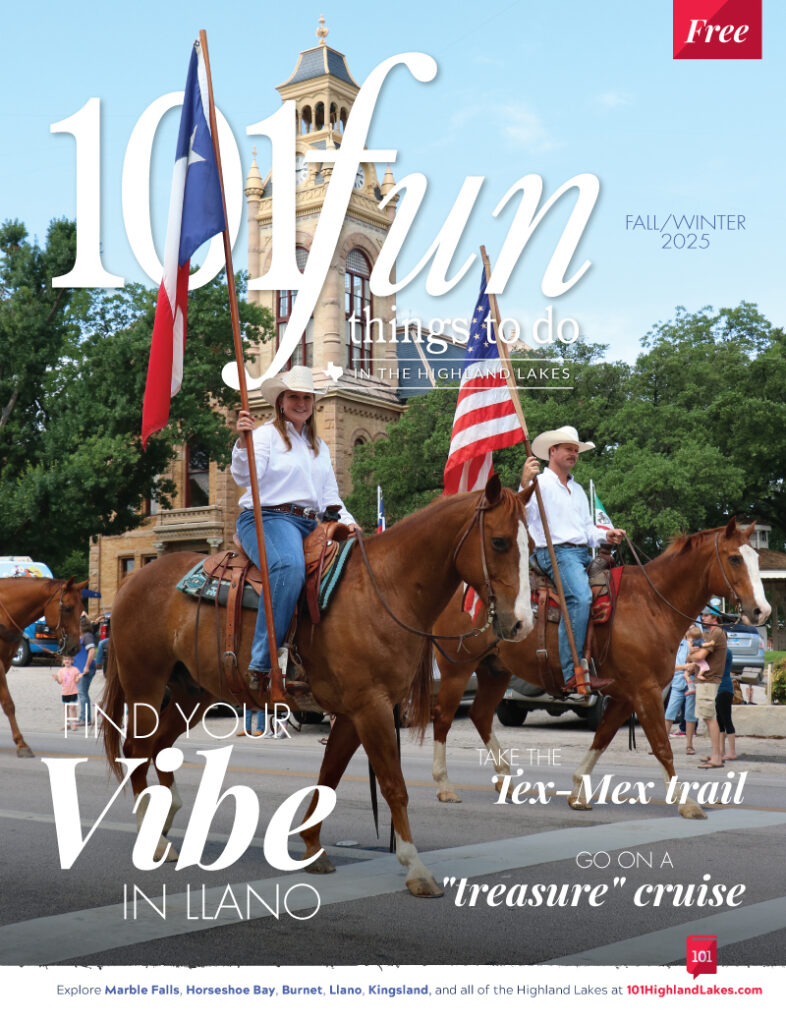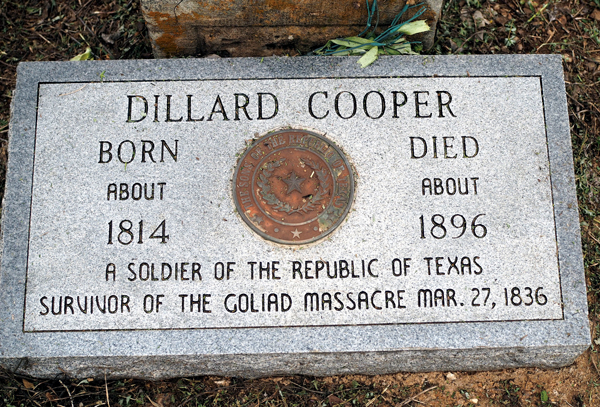
Dillard Cooper is buried in Llano City Cemetery. As a soldier in Capt. Jack Shackleford’s Red Rovers, volunteers from Alabama, Cooper took part in Texas’ fight for independence from Mexico. He escaped the Goliad massacre. Staff photos by Daniel Clifton
As Dillard Cooper raced across an open field for the cover of nearby woods, helping along a wounded friend, he probably wished he had never left the red clay of Alabama or the piney woods of South Carolina for what is now Southeast Texas. But with certain death charging a few hundred yards behind him, neither Cooper nor his three companions had much time to consider what might have been had they not volunteered several months earlier for Capt. Jack Shackleford's Red Rovers.
Now all Cooper could think about was beating a hasty path from the farmhouse in which he and his three fellow soldiers had taken refuge to some woodlands as several Mexican soldiers on horseback charged in their direction. The four men — who had escaped the Goliad massacre a few days earlier — knew they would get no mercy if caught.
As they headed for cover, one of the men, Wilson Simpson, was running with only one shoe as the men helped Isacc Hamilton, who suffered a gunshot wound to one thigh and a bayonet wound to the other.
When they reached the woods, the men spotted two trees that had fallen together. The tops of the trees leaned in on one another, offering the best hiding place they could find. A thick layer of leaves, moss, and other woodland materials provided even more protection from the coming Mexican soldiers.
Those soldiers, some on horseback and some on foot, entered the woods and began looking for the four men. They poked through the brush, checked areas of possible concealment, and shouted and yelled in an effort to either find the four or at least scare them from cover.
[image id="19532" title="Dillard Cooper historical marker" linkto="file" ] A historical marker for Dillard Cooper, a volunteer who helped in Texas' fight for independence from Mexico.As the searchers swarmed around them, the hidden men worried that even a breath would catch their attention and give them up.
This wasn't how the battle for Texas independence was supposed to go for these men and the 320-plus others under Col. James Fannin's command at Presidio la Bahia near the town of Goliad.
Cooper, Simpson, Hamilton, and Zachariah Brooks volunteered for the Red Rovers in Alabama to help the Texians fight for independence from Gen. Antonio Lopez de Santa Anna, the Mexican leader. Cooper hailed from South Carolina but volunteered in Alabama for the Red Rovers. Once in Texas, the Red Rovers joined with Fannin's command at the Presidio.
It was March 1836, and Gen. Sam Houston, commander of the Texas forces, had ordered Fannin to fall back from the Goliad area. Houston feared an attack at Goliad, where fewer than 400 men stood, would lead to losing more soldiers after the fall of the Alamo. Fannin, for some reason, decided to stay in Goliad. Eventually, Fannin did begin to fall back from the position, but by this time, a Mexican contingent of about 1,400 was well on its way.
The Mexican unit caught up to Fannin near Coleto Creek, west of Goliad. Fannin formed his men in a square, placed cannons at the corners, and tried to hold off the Mexican attack.
Once he realized he was overwhelmed, Fannin surrendered, but under the conditions that the men would be fairly treated as prisoners of war and those not from Texas would be allowed to return to their homes.
The Mexican troop marched the captured soldiers back to Goliad.
On March 27, 1836, a Palm Sunday, the Mexican soldiers gathered up the captured men — those who were mobile — and marched them out of the fort. The men were separated into three groups. At this time, they believed they were either heading for transport to New Orleans or out to gather wood and livestock. But the men soon realized the Mexican army — under direct orders from Santa Anna — had much more nefarious plans.
Cooper stood next to Simpson and another man, Robert Fenner. At the realization the soldiers were about to execute them, many of the doomed men began to cry out. But Fenner called out to them, "Don't take on so, boys. If we have to die, let's die like brave men."
Just as Fenner was saying this, Cooper caught the flash of a musket over his shoulder. He immediately threw himself to the ground. The move saved his life. Fenner, however, wasn't so fortunate. His dead body collapsed upon Cooper, pinning him there momentarily. Cooper struggled out from under Fenner's body and raced for an opening in the nearby brush fence.
Simpson, who also survived the initial volley of musket rounds, was a few feet ahead of Cooper, making for the same gap.
Mexican soldiers chased after the two. The men were able to shake off the pursuers in the thick timber near the San Antonio River. By the river, they hooked up with the wounded Hamilton and Brooks.
The four headed up river, skirting the Goliad area. Near the fort, the men spied numerous fires and smelled the unmistakable odor of burning flesh. The Mexicans, despite pleas from Texian leaders for Christian burials, were destroying the bodies of the men they had just killed. Some reports state they even burned men alive.
Whether looking for the escapees or simply on patrol, Mexican soldiers threaded through the the area. Cooper and his companions traveled mostly at night, taking cover during the day. At one point, a Mexican patrol passed the men by only a few yards as the escapees covered themselves with natural materials and put their faces into the ground.
[image id="19533" title="Dillard Cooper grave in Llano City Cemetery" linkto="file" ] Dillard Cooper's grave in Llano City Cemetery.One of the only things they had to eat was vegetation from an elm bush. But they eventually found the house on the Lavaca River and were able to find food. Simpson had taken off one shoe to carry eggs in it when he made the remark that if the Mexicans found them they'd be in a "tight spot." Within moments, he looked out the window to see the Mexican army in the distance and 15-20 horsemen several hundred yards away, galloping toward the house.
The men hastened a retreat to some nearby woods, again barely escaping capture.
Their journey continued in such a manner, hiding at day, traveling at night, and often coming within yards of Mexican soldiers.
Hamilton's wounds plagued him and forced the four to travel at a slower-than-preferred pace. Simpson and Brooks, at one point, discussed leaving Hamilton behind, but Cooper resisted.
Hamilton, however, agreed with Simpson’s and Brooks' assessment. He urged them to leave him behind.
By this time, they were near Texana (now covered by Lake Texana). They had been traveling for 10 days.
Even at Hamilton's urging, Cooper still didn't like the idea of leaving him, but agreed. As Simpson and Brooks headed off, Cooper had second thoughts and decided to stay behind. But again, Hamilton urged him to go, which, he reluctantly did, catching up to his other two friends.
As rain poured down on them, the three trekked through the prairie, at one time spying the Mexican army encampment off in the distance. They again avoided detection and continued northward.
Two days later, the men came upon the Colorado River at Mercer's Crossing (probably located south of Egypt today and northwest of Wharton). A barking dog on the other side of the river greeted them. It was probably the first time the three had really laughed since Goliad. They managed to cross the river using a log.
Despite their experiences while in Texas, the three weren't done with the fight. They gathered some horses and made haste to join Houston and his army. But they learned Santa Anna had recently surrendered to Houston.
As for Hamilton, he survived but was recaptured. He was supposed to be taken to Victoria, where he would be executed, but one of his captors warned him of the impending execution and urged him to escape, which he did.
After the war, Cooper went to South Carolina to retrieve his wife, Lucinda, and their child. He returned to Texas, taking up some land outside of Columbus. The family stayed in the area, but after Lucinda died in 1877, Cooper moved around a bit before settling in Llano County.
Despite his heroics, Cooper felt some resentment toward the Texas government because he spent the last years of his life living on a $150 annual "pitiful pension."
He died in 1896 in Llano and is buried in Llano City Cemetery. He and Lucinda had five children.
Dillard Cooper, who lived his later years in Llano County, was one of only a handful of men who survived the Goliad massacre on March 27, 1836, at the hands of the Mexican army. He came from South Carolina to fight for Texas' independence as a member of the Alabama Red Rovers, an all-volunteer unit made up of men from Alabama and South Carolina. Cooper is buried in Llano City Cemetery, and a historical marker stands at the foot of his grave commemorating his contribution to Texas.
daniel@thepicayune.com


